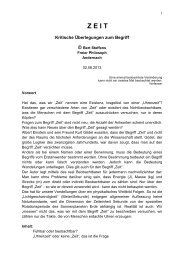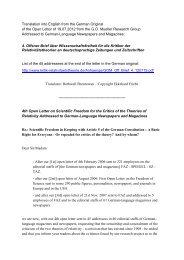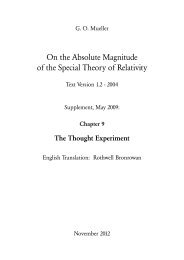2394 weitere kritische Veröffentlichungen - Kritische Stimmen zur ...
2394 weitere kritische Veröffentlichungen - Kritische Stimmen zur ...
2394 weitere kritische Veröffentlichungen - Kritische Stimmen zur ...
Erfolgreiche ePaper selbst erstellen
Machen Sie aus Ihren PDF Publikationen ein blätterbares Flipbook mit unserer einzigartigen Google optimierten e-Paper Software.
This attitude has on the one side almost totally discouraged<br />
the production of free critical thought, and on<br />
the other side has crystallized the foundations of established<br />
Physics in a system of dogmatic immobility - a<br />
situation which forced many intellectuals (not only<br />
physicists) to understand scientific knowledge as a kind<br />
of "religion" (a thought system in which beliefs cannot<br />
be checked by laymen, or not even really "understood"<br />
..."<br />
"Even today, things are continuing in this manner,<br />
as far as leading scientific journals are concerned, but<br />
the increasing diffusion of the Internet has allowed<br />
greater freedom of expression and communication, and<br />
this has supported the acquisition of unconventional<br />
news and points of view, thus showing that discomfort<br />
towards the actual establishment's philosophy of Nature<br />
and of Science is rather widespread. In this page,<br />
we offer some interesting examples of this "resistance",<br />
which becomes more and more worth of attention, the<br />
more some investigations could lead to unexpected and<br />
very positive practical consequences ..."<br />
Bartocci, Umberto 2002<br />
A letter from the editor to the readers / Umberto<br />
Bartocci.<br />
In: Episteme. An international journal of science, history<br />
and philosophy. Nr. 6, Parte 2. 2002, 21. Dez., ca. 6<br />
S. = http://itis.volta.alessandria.it/episteme/ep6/<br />
ep6-II.htm<br />
SRT. ART. QT. SOZIO.<br />
Der Herausgeber präsentiert zum Abschluß der ersten 3<br />
Jahre der halbjährlichen Zeitschrift "Episteme", die sowohl<br />
gedruckt erscheint als auch online veröffentlicht<br />
wird, ein Sonderheft (Nr. 6, Teil 2), das ganz der Kritik<br />
der Relativitätstheorien gewidmet ist. Er berichtet von<br />
sich selbst (in der dritten Person), wie er als Mathematiker<br />
<strong>zur</strong> Kritik der herrschenden Physik gekommen ist:<br />
"He used to teach modern formalistic mathematics,<br />
telling his students - as it is usual under these circumstances<br />
- that the highly sophisticated approach they<br />
were called to follow (since the very foundations), was<br />
necessary, due to the "well known" great achievements<br />
of physical research at the beginning of XXth Century.<br />
Most teachers roughly satisfy the need of motivations<br />
in this way, but the editor decided, at some point of his<br />
career, to study with more attention the previous statement,<br />
in order to be able to persuade better (mostly<br />
himself!) that the renunciation to intuition, which was<br />
demanded by the formalistic approach to the "nature"<br />
of mathematical objects, was rather justified, and wise -<br />
notwithstanding his long personal teaching experience,<br />
which, quite at the contrary, had shown very clearly to<br />
him that mathematics could have been taught in a quite<br />
simpler way by using at the beginning the intuition of<br />
ordinary space (euclidean geometry, measuring, real<br />
numbers) and time (arithmetics, counting, natural numbers,<br />
order), instead of abstract structures. So he went<br />
G. O. Mueller: SRT. Kap. 4-Erg.<br />
66<br />
on studying the physical connection, analysing in some<br />
detail the famous historical experiments, which led<br />
people such as Feynman to claim that "classical" explanations<br />
were "absolutely impossible".<br />
When he started this research he was quite sure that<br />
he would have found all in perfect order, and that he<br />
would have come back to his beloved pure mathematics<br />
in a very short time: but 20 and more years have elapsed<br />
since then, and he has found himself more and more<br />
sinking into a deep bog, and he was persuaded at last<br />
that the "magnificence", and the experimental ground,<br />
of some theories as relativity, or quantum mechanics<br />
(in its widespread "irrational" Copenhagen interpretation)<br />
was more an effect of propaganda, rather than of<br />
objective science (namely, a science which is based on<br />
certain experimental data, and deductions), or of logical<br />
"impossibilities".<br />
This persuasion of the necessity of a new literal revolution,<br />
of the restoration of ordinary rationality in<br />
Natural Philosophy, appears - we would dare say - a<br />
common thread connecting the papers collected in this<br />
volume, wholly dedicated to criticism and alternative<br />
to the pillars of XXth Century physics, relativity, relativistic<br />
cosmology, etc.."<br />
Formuliert in Fußnote 11 sein Urteil über die akademische<br />
Physik: "... it appears very unlikely that the<br />
establishment would be willing to recognize that relativity<br />
gave a quite misleading image of the universe, and<br />
that they followed a completely wrong path for more<br />
than 100 years."<br />
Bartocci, Umberto 2002<br />
Looking for special relativity's possible experimental<br />
falsifications / Umberto Bartocci.<br />
In: Episteme. An international journal of science,<br />
history and philosophy. Nr. 6, Parte 2. 2002, 21.<br />
Dez., ca. 29 S. =<br />
http://itis.volta.alessandria.it/episteme/ep6/<br />
ep6-II.htm - http://www.dipmat.unipg.it/~bartocci/<br />
ep6/ep6-bart.htm<br />
SRT. ART. MAXWELL. ABERR. SAGNAC. EXP.<br />
MATH.<br />
"Introduction - We already had the opportunity to<br />
describe, in the Letter... which opens this special number<br />
of Episteme, the fundamental reasons which should<br />
inspire a general criticism of relativity, or, better, of the<br />
"philosophy" which was (and is) the ground of Einstein's<br />
success. This paper is an attempt to analyse the strictly<br />
physical (phenomenological) situation, in order to give<br />
a suggestion where to look for possible experimental<br />
falsifications of the theory (from now on SR, special<br />
relativity [1]), in the conviction that this is the only<br />
possible manner to show that the main assumption of<br />
"abstract physics" supporters is wrong: namely, that the<br />
renouncing to ordinary space, time, causality, was not a<br />
"nihilistic caprice", but a necessity forced by facts.<br />
This analysis is not so easy as it could appear, since<br />
Textversion 1.2 - 2012





